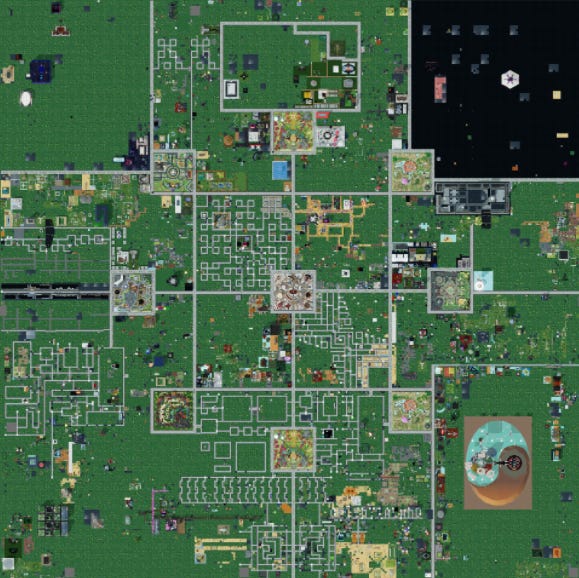How NFTs are Poised to Change our Lives
The Future of Digital Fashion, Real Estate, Music Rights and more
Making sense of NFTs or smart contracts is challenging. History has proven, when there is new technology, it takes time before the tech can be accepted and embraced. But now, we are forced to adapt more quickly. The utilities built into NFTs are enabling fashion houses to have digital collections, video games to draw us into new worlds and metaverses, plots of land to be purchased and sold within them, music and song royalties to be placed in the hands of the fans, Fine Art to be purchased through DAOs and fractional ownership, and charities use NFTs to garner greater understanding, fight for social justice, and collect more donations. These are just a few examples of the infinite number of sectors that NFTs will and are reaching into and turning upside down. Let’s dive into 3 of them…
Digital Fashion:
Footwear made for your digital closet? Why, yes! Atari, as in the home video game console pioneer, has created an Atari sneaker in collaboration with RTFKT Studios, who dominates the fashion crypto space (and has recently been purchased by Nike). Atari is not the only brand trying to capture the market, Nike, Gucci, Louis Vuitton, Dolce & Gabbana, among other fashion houses have created their own collaborations and tokenizations of shoes, fashion, and accessories in attempts to engage with their audiences.
The idea behind these sneakers or other crypto fashion items, is that brands will be able to connect with their fans in “offline” shopping. Users are currently able to try on the sneakers in apps or they can have their avatars wear them and transport them to other games. This idea is based on the premise that AR and VR technology will continue to expand and proliferate into our personal lives.
Facebook, now Meta, is field-testing their Ray-Ban smart glasses and neural wristbands in partnership with BMW, while Apple is working on its AR/VR and mixed reality headsets, which could hit the market as soon as the end of 2022. Therefore, it is not farfetched to assume that shopping for digital accessories can be the next consumer obsession.
Digital Real Estate:
As soon as Mark Zuckerberg announced his plans to rebrand Facebook to Meta and described what the Metaverse may look like in the near future, digital real estate prices sky rocketed. Plots of land, (digital land, not physical land), have been purchased on a grand scale in popular Decentraland and The Sandbox among other metaverses. The idea behind these big investments is that people will congregate in the Metaverse and go to a concert, museum, or fashion show. Concerts have already been given by artists including Arianna Grande, Justin Bieber, DJ Marshmellow, and Paris Hilton who have performed in avatar form. Brands like Adidas and Atari have purchased land as well, forging into the future in the belief that retail will be a substantial part of the metaverse economy.
The prices of these lots of land are designated in much the same way as physical real estate. Location, proximity to the Metaverse center, and size, are the essential qualifying factors. There have been estimates which report that the digital real estate market in the metaverse will grow to a $1 trillion dollar business in the near term. However, investing in digital real estate is still very risky and investors should be cautious when making these purchases.
Music Rights:
In the music industry, there has been a wave of artists embracing the flexibility and transparency of ownership that the NFT offers. Throughout 2021, artists such as Grimes, 3LAU, Steve Aoki, Kings of Leon, and The Weeknd showed how packaging art, music rights, and experiences could be sold through blockchain technology for vast sums of money.
The infamous EDM artist, Justin Blau or 3LAU, and partner JD Ross, co-founder of Opendoor, are taking music rights a step further with their new platform Royal. Royal is a music platform that allows fans to purchase “tokens” or music rights of their favorite musicians, allowing fans to bet on their convictions and participate in the rise or fall of their artists’ music. Backing this endeavor with a $55 million investment is venture capital firm Andreessen Horowitz. Blau states: “The quickest way to explain it is that music royalties are an asset class that the public has never had access to.” Furthermore, he claims that “There’s emotional value to a fan in owning music that’s not being captured by the market today.” Blau believes that his platform will allow disenfranchised music artists greater control and power over their work, aligning fans’ incentives with the success of the artist.
Hopefully this article has helped open your eyes to how NFTs are a revolutionary technology with boundless opportunities for growth and how NFTs will develop new business economies throughout the 21st century.
Stay Curious!
~NFT Art Source
Article by: Iris Pearlman
Disclaimer: All opinions set forth in this article does not constitute financial advice in any way whatsoever. Nothing published here constitutes an investment recommendation, nor should any data or content published here be relied upon for any investment activities.



